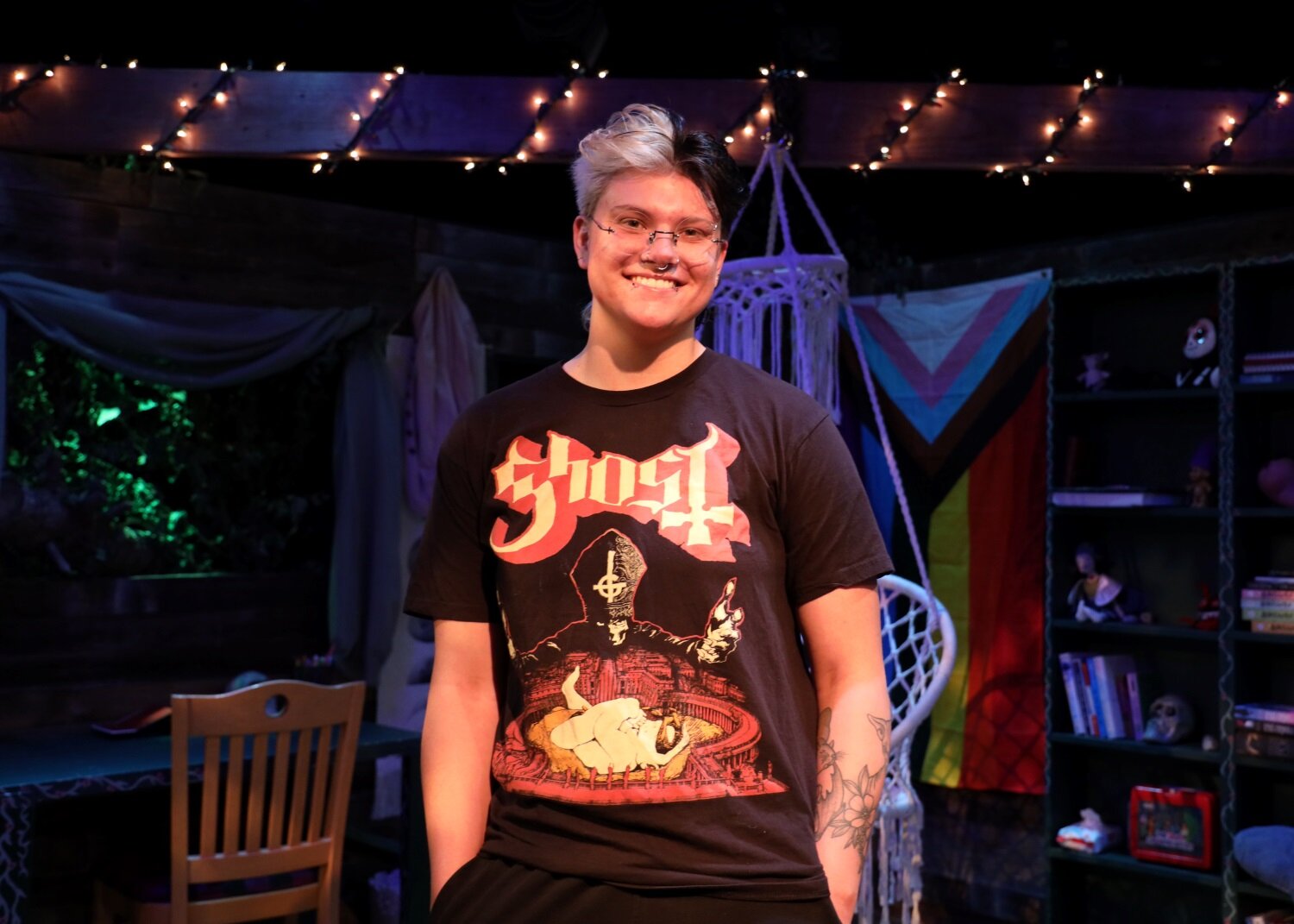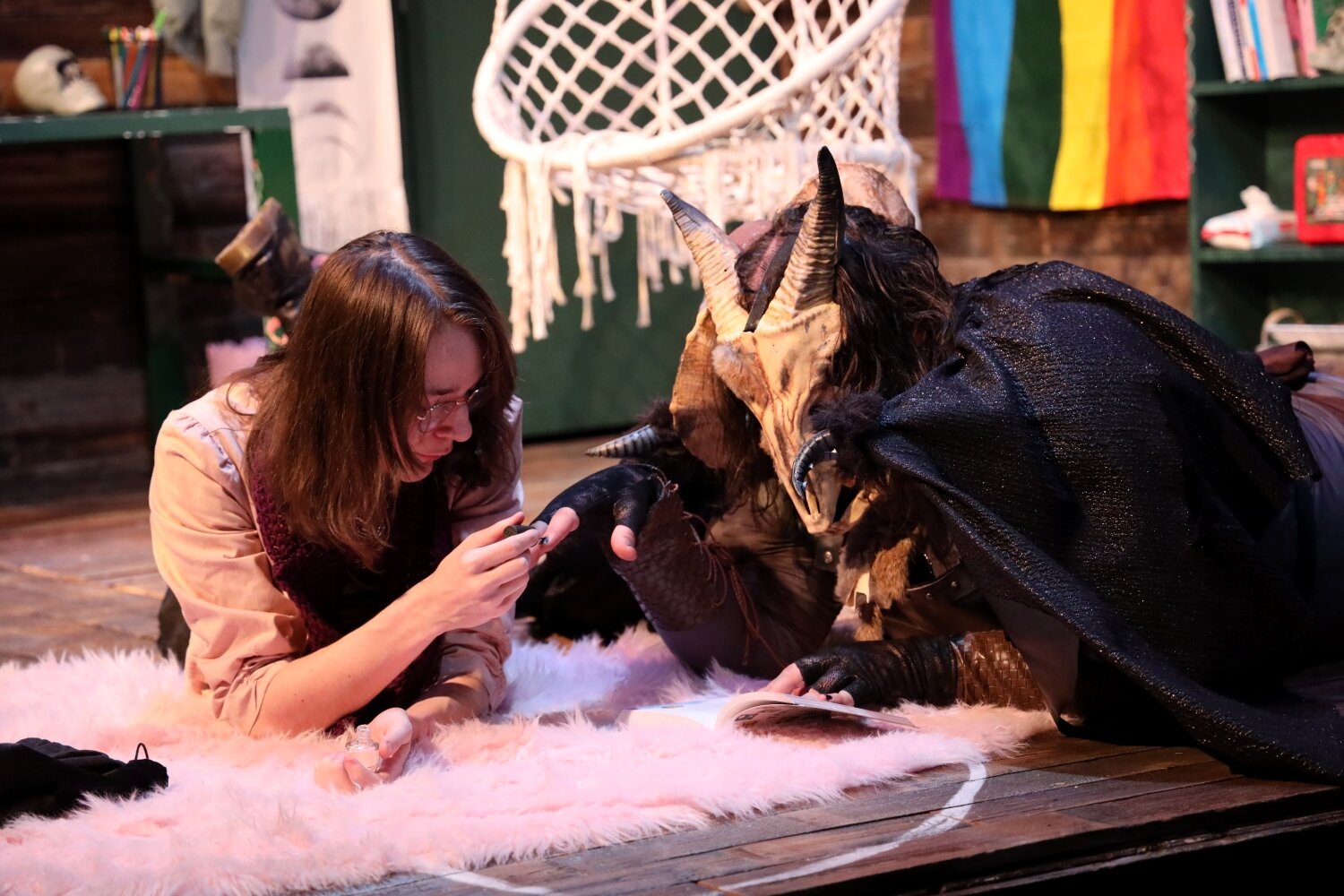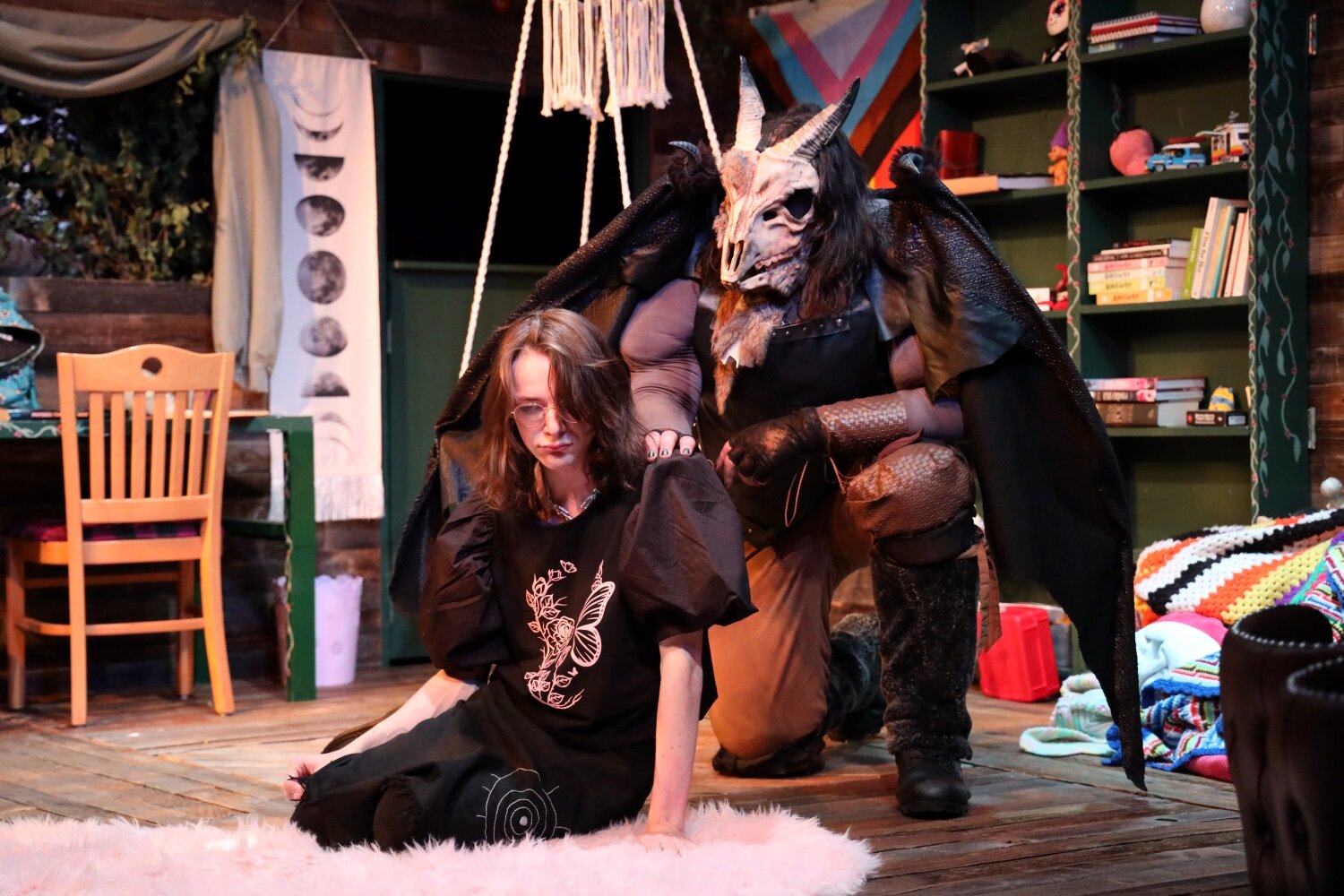‘Dark comedy with a side of social justice': The experience of transgender youth takes center stage

COLORADO SPRINGS, Colo. — Tucked in the back of a game store along Old Colorado City’s main strip, a cozy speakeasy houses a temporary stage. The set, designed to resemble a teenage girl’s treehouse, includes a bookshelf of young adult novels, a hanging macrame chair and a Panic! At The Disco poster.
And, of course, a demonic summoning circle.
Springs Ensemble Theatre kicked off its 14th season with “Midge and the Butcher," a horror-comedy about transgender teen Midge who summons a demon to ward off her high school bully.
The play, written by SET member Quinn Smola, premiered September 28 at The Fifty-Niner, a hidden speakeasy in Colorado Springs.
“Dark comedies are kind of our thing,” director Sarah Sheppard Shaver said of SET’s repertoire. “With a side of social justice and hard community conversations.”
Homegrown talent
The Colorado Springs-based theater company aims to serve as an incubator for local talent. Part of that mission includes showcasing original work from local playwrights, like Quinn Smola. “Midge and the Butcher” is Smola’s first full-length play.
“It's definitely a passion project,” Smola said. “It's not something that we had a lot of money to throw at, but we had a lot of passionate people working on it.”

SET member Quinn Smola began writing “Midge and the Butcher” in February 2021.
Though rehearsals started in mid-August, Smola began developing this story over two years ago. While working towards his associate’s degree at Pikes Peak State College (PPSC), Smola took a playwriting class taught by Shaver, one of SET’s founding members.
A series of broad writing prompts led Smola to develop the setting (a treehouse), a character that belonged (a teenage girl) and a character that didn’t belong (a demon). The conversation between these two opposing characters became the basis for the play’s first scene.
“I was just like, ‘Oh my god, this is so good,’” Shaver recalled. “I want to know more. I want to see where this goes.”
Shaver encouraged Smola to workshop the story, and together they turned it into a two-act play. Smola has since graduated from PPSC and now attends the University of Colorado, Colorado Springs.
A spotlight on queer experiences
The story first reached audiences in March at a sold-out event celebrating Transgender Day of Visibility. At that event, actors performed the script in a staged reading, without a full set.
Isaiah Culling plays the demon, Xantheus the Butcher. Both Culling and their character use they/them pronouns. They performed as Xantheus at the staged reading in March and their voice and physical presence fit the character so well, Smola said, that they were asked to play the role again in the full production.
On stage, Xantheus’ menacing appearance is softened by expressions of humanity — both mundane and meaningful. The play reveals that, as a demon, Xantheus doesn’t subscribe to humans’ concept of gender. For recently-out Midge, the demon’s perspective is a welcome change from her conservative community.
“[Xantheus] is very relatable and staunchly empathetic and accepting of Mitch,” Culling said. “I think, for me, that's what might come as a surprise to audiences.”

Throughout the play, Midge (Rose Mitchell) and Xantheus the Butcher (Isaiah Culling) develop an unlikely friendship.
The entire cast and many of the backstage crew identify as queer. Smola, a gay transgender man, is excited to bring so much queer representation, especially of transgender youth, to the stage.
“You don't see a lot of trans characters in anything,” Smola said. “When you do, they're typically portrayed in very stereotypical ways or background characters without a real character arc.”
Rose Mitchell, who plays Midge, decided to audition because she saw her own experiences as a transgender woman reflected in the script, minus the demon parts.
Midge summons the demon to get revenge on her bully, Hunter. Hunter used to be her best friend, but after Midge came out, he refused to accept her identity. Hunter tells her — along with several other crude comments — that she’s making a mistake, despite her insistence that she’s always felt this way.
“If anyone knows a Hunter kind of person, then I hope that this play can show people that that though they seem well-intentioned, it's not helpful,” Mitchell said.
Colorado Springs has a history of anti-LGBTQ+ sentiment and legislation. In 1992, Christian fundamentalists in the area were instrumental in passing Amendment 2, which prevented anti-discrimination laws protecting LGBTQ+ people in Colorado. Last November, a mass shooting at Club Q, a well-established gay nightclub, brought that hate to the forefront again.
Smola is originally from the Midwest, where the play is set, but went to high school in the Colorado Springs area. He says his experience growing up in the community was varied, finding acceptance from some people and not from others. Though he wouldn’t describe Colorado Springs as a definitively safe space for LGBTQ+ folks, he said there is a proud and accepting community out there.
“There are definitely amazing pockets of Colorado Springs and amazing people here,” Smola said. “It's just we need to band together and make it better.”
Mitchell, who studies theater at PPSC, is excited to be working within one of those pockets and creating art that represents the LGBTQ+ community.
“I think there's not enough queer art out there,” Mitchell said. “I'm really proud to be making more with these great people.”

Audiences see Midge struggle with transphobia, dysphoria and self-harm ideation.
New venue could open door to new audiences
This is SET’s first season at its new venue, the Fifty-Niner. After 13 years at the same location, soaring rent prices drove SET to search for a new home. Though the company is still settling into its new location in Old Colorado City, Shaver hopes being in the area will attract new audiences.
“I think we'll get a lot more walk-in traffic,” Shaver said. “This is a cultural center of town. It’s kind of exciting to think about people off the street or shopping might be like, ‘What’s this? Let's go in and check it out.’”
As for what director Shaver hopes audiences will take away from the show:
“I hope a little empathy,” Shaver said. “I hope an appreciation for the struggles of trans teens and the demons who love them.”
"Midge and the Butcher” runs through October 15. Audiences should note that the performance includes a brief but graphic, stylized torture scene in the second act. Tickets are available here.
Carly Rose is the journalism intern at Rocky Mountain PBS and can be reached at carlyrose@rmpbs.org.